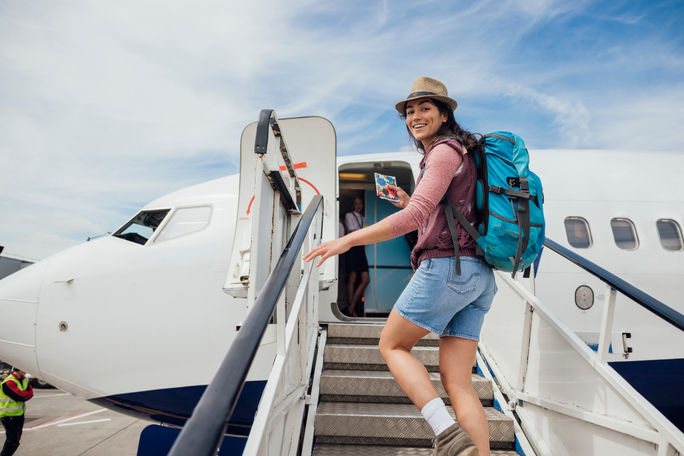Whenever I share my belief that the travel consumer is different from most others, I usually get pushback. But that sentiment is founded on research I had access to in one of my corporate roles, which was highly trustworthy.
However, since that data is proprietary and not shareable, I decided it might be a good idea to see how well-supported it was elsewhere, and as it turns out, the concept is very well-supported!
A study conducted earlier this year and published in the Journal of Travel Research validated that consumers purchasing or considering travel or vacations are far more susceptible to "loss aversion" than those considering other purchases of the same value (Lin et al., 2023).
What is loss aversion?
Loss aversion is a cognitive bias that describes why, for individuals, the pain of losing is psychologically twice as powerful as the pleasure of gaining. The loss felt from money, or any other valuable object can feel worse than gaining that same thing. In other words, people have far more reservations and concerns about the risks associated with travel than they do almost anything else. Nobody wants to book a horrible vacation for their family.
A research study in the Journal of Vacation Marketing identified no less that 20 risk points that travel consumers feel impact their consideration process to some degree, and the study concluded by pointing out that "standard risk inventories might not be the best starting point for perceived-risk studies in the context of tourism research” (Dolnicar, 2005).
Said another way the process for travel consumers was more complicated and there is more going on than there is with other types of purchases.

A young traveler setting out. (Photo Credit: SolStock/E+)
We might think education is the solution, and we need to share a lot of content with these potential travelers, which will put their minds and hearts at ease. However, although that has been the industry's typical response (we love to inundate people with information), it may be doing us more harm than good.
Another similar study was published earlier this year in Anatolia (An International Journal of Tourism and Hospitality Research). This research indicated an anomaly within the travel and tourism space. Results proved that "those who used more information sources to collect information before travel perceived significantly higher destination risk during travel." In other words, the more they learned, the more nervous they became (Kökény et al., 2022).
These peculiarities help us understand some profound behaviors we have probably observed for years:
- It explains why people often fall into travel ruts, visiting theme parks, taking cruises, or renting a beach house on Cape Cod year after year. The familiarity of these trips provides predictable outcomes and lessens risk.
- It explains why the acquisition costs of finding new visitors are so challenging and expensive. It is not enough to inform or create awareness; there is a huge hump that most travelers need to cross before saying yes and authorizing the purchase.
- It explains why many companies in our space still sell face-to-face, via brick-and-mortar stores, or via the telephone or video conference continue to thrive. People, usually agents, can evangelize and help others feel confident and eliminate their fear if they are skillful.
This circumstance challenges everyone attempting to sell a complete vacation package or market a resort or an attraction. There is always an enemy in the room, and that enemy is the consumer themselves.
How can we counter that type of resistance if we do not have call centers or agents and do so without swamping the person with more data?
Around COVID, we saw an aspect of this manifest itself in the extreme. Members of the travel community quickly realized that if we were going to get anyone to travel, we needed to put their fears at ease. We witnessed an era of unprecedented "cancel for any reason" policies and "free trip insurance" supported by guarantees and money-back offers. Then little by little, those new policies slipped away. There is good reason for their sudden absence. These offers were typically products that were offered as upgrades or upsells (depending on who you were). They represent some of the industry's most profitable pieces of business, and we all love our profit. However, at least in this case, we may love it too much.
Is it time to re-examine the model and include these items for everyone, maybe at a more reasonable cost, to remove the broader obstacles that could have a long-term adverse effect?

Travelers hiking above Lake Lugano in the Alps. (photo via AscentXmedia/E+)
As you read this, our industry is being swept up in the fervor of AI and what it can do for travel and hospitality, who it can replace, and how it will enhance the experience for consumers. However, any enhancement for the consumer needs to be something they have determined to be an enhancement.
Simply thinking it is cool or that it solves a particular problem is insufficient evidence that it is or will. With decades of consumer research available and countless examples of how customer-centric strategies have succeeded, we must be careful, given that we have yet to figure this problem out.
Remember, AI only builds on the information already out there. As pointed out earlier, that will result in simply dousing the consumer with more information when they have concerns or reservations about travel. It will not work. It will not re-assure or create confidence. We might need a little re-programming ourselves before we can adequately execute anything with AI.
Should we stop? Should we pause? I am not sure and even if I was it would be very difficult to hold back the tide of enthusiasm around AI. My ask is far simpler, I would like us to not ignore the consumer sentiment that exists, that is very real and very documented. If we could, for a change, combine regular intelligence with future artificial intelligence, maybe we would have a winning combination.
Topics From This Article to Explore